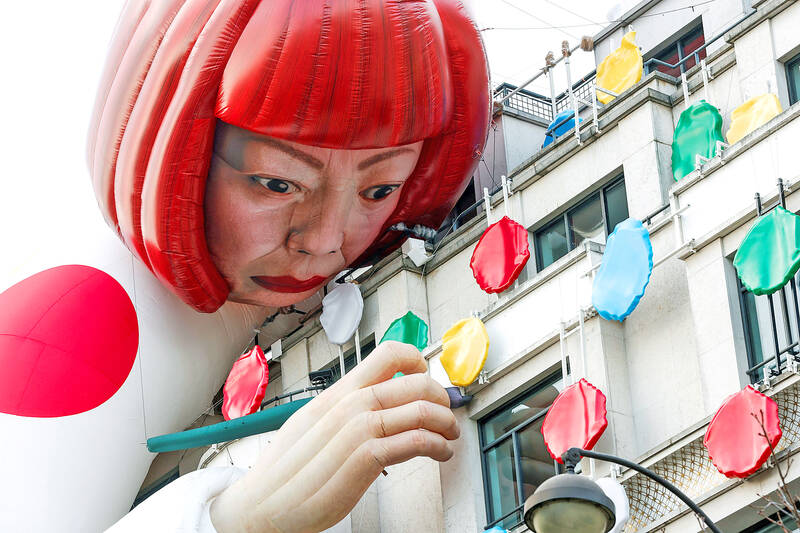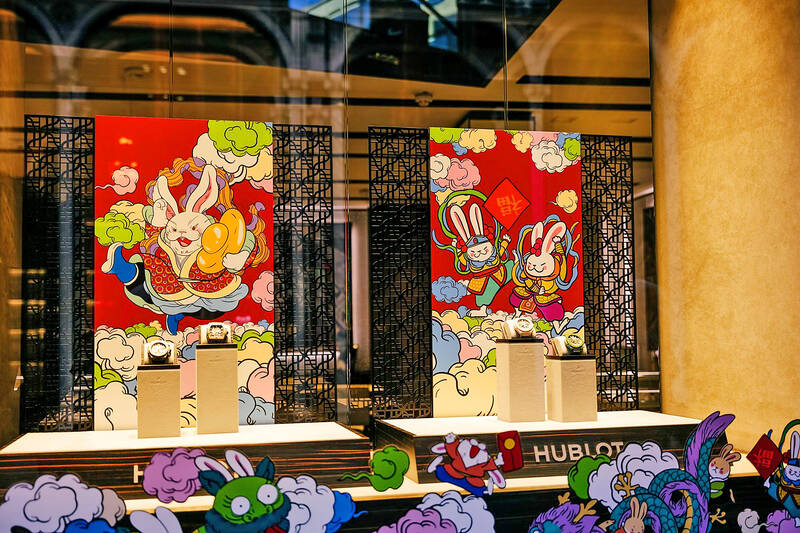The European luxury sector is welcoming the end of pandemic lockdowns in China, as the return of big-spending Chinese tourists could sustain further growth.
Prior to the pandemic, Chinese tourists visiting Europe were a major source of sales for luxury houses. The Chinese accounted for “a third of luxury purchases in the world and two-thirds of those purchases were made outside China”, said Joelle de Montgolfier, head of the luxury division at management consulting firm Bain & Co.
Their return has led RBC Bank to revise up its growth forecast for the sector this year to 11 percent, from 7 percent previously.

Photo: Reuters
“China reopening is one of the key ‘mega-themes’ for the luxury sector in 2023,” RBC Bank said in a recent note to clients.
After a drop in 2020, the luxury sector managed to surpass its pre-pandemic sales in 2021.
“The Chinese consumed, but only in China,” Bain’s De Montgolfier said.

Photo: Bloomberg
“In 2022, it was much more complicated with unexpected confinements in the country,” she added.
Nevertheless, that did not hold the sector back from making an estimated 22 percent jump to 353 billion euros (US$384 billion), according to a November forecast issued by Bain & Co.
That growth was supported by the wave of post-lockdown US tourists visiting Europe armed with a strong US dollar, as well as South Korean and Southeast Asian tourists.
Another pleasant surprise was Europeans “who had been ignored for decades ... and were more interested in luxury goods than expected,” said Erwan Rambourg, a luxury industry insider turned analyst and author of the book Future Luxe: What’s Ahead for the Business of Luxury.
With the lifting of travel restrictions in China “there will be a considerable return of Chinese tourists, but that will be more likely in the second quarter,” said Arnaud Cadart, a portfolio manager at asset manager Flornoy & Associates.
“The pandemic is still very active in China and it will affect lots of people,” Cadart said.
Chinese tourists may be needed if the flow of US tourists slows.
“European boutiques need this rebound in Chinese clientele to replace its American clientele which could buy locally,” Cadart said.
They also need to readapt to Chinese customers, who tend to travel in groups, and will join a large number of US tourists.
“There are already lines in front of the boutiques even without Chinese clients ... they need more staff,” De Montgolfier said. Otherwise, they risk a “degradation of the experience” of shopping in a luxury boutique.
Another concern: the volume of merchandise that Chinese customers will want to buy is unclear. The sector likes to keep volumes low and does not discount to ensure exclusivity.

Hon Hai Precision Industry Co (鴻海精密) yesterday said that its research institute has launched its first advanced artificial intelligence (AI) large language model (LLM) using traditional Chinese, with technology assistance from Nvidia Corp. Hon Hai, also known as Foxconn Technology Group (富士康科技集團), said the LLM, FoxBrain, is expected to improve its data analysis capabilities for smart manufacturing, and electric vehicle and smart city development. An LLM is a type of AI trained on vast amounts of text data and uses deep learning techniques, particularly neural networks, to process and generate language. They are essential for building and improving AI-powered servers. Nvidia provided assistance

DOMESTIC SUPPLY: The probe comes as Donald Trump has called for the repeal of the US$52.7 billion CHIPS and Science Act, which the US Congress passed in 2022 The Office of the US Trade Representative is to hold a hearing tomorrow into older Chinese-made “legacy” semiconductors that could heap more US tariffs on chips from China that power everyday goods from cars to washing machines to telecoms equipment. The probe, which began during former US president Joe Biden’s tenure in December last year, aims to protect US and other semiconductor producers from China’s massive state-driven buildup of domestic chip supply. A 50 percent US tariff on Chinese semiconductors began on Jan. 1. Legacy chips use older manufacturing processes introduced more than a decade ago and are often far simpler than

STILL HOPEFUL: Delayed payment of NT$5.35 billion from an Indian server client sent its earnings plunging last year, but the firm expects a gradual pickup ahead Asustek Computer Inc (華碩), the world’s No. 5 PC vendor, yesterday reported an 87 percent slump in net profit for last year, dragged by a massive overdue payment from an Indian cloud service provider. The Indian customer has delayed payment totaling NT$5.35 billion (US$162.7 million), Asustek chief financial officer Nick Wu (吳長榮) told an online earnings conference. Asustek shipped servers to India between April and June last year. The customer told Asustek that it is launching multiple fundraising projects and expected to repay the debt in the short term, Wu said. The Indian customer accounted for less than 10 percent to Asustek’s

Gasoline and diesel prices this week are to decrease NT$0.5 and NT$1 per liter respectively as international crude prices continued to fall last week, CPC Corp, Taiwan (CPC, 台灣中油) and Formosa Petrochemical Corp (台塑石化) said yesterday. Effective today, gasoline prices at CPC and Formosa stations are to decrease to NT$29.2, NT$30.7 and NT$32.7 per liter for 92, 95 and 98-octane unleaded gasoline respectively, while premium diesel is to cost NT$27.9 per liter at CPC stations and NT$27.7 at Formosa pumps, the companies said in separate statements. Global crude oil prices dropped last week after the eight OPEC+ members said they would